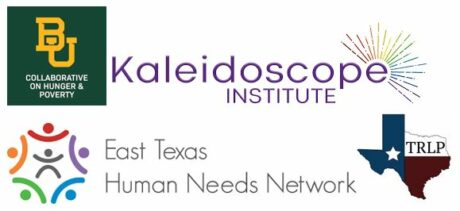
EHF’s Poverty Transformation Cohort is halfway through their program and are in the beginning stages of working with their chosen consultants. The Poverty Transformation Cohort aims to move congregations with existing outreach ministries away from a charity-based focus and towards a transformative and community-engaged ministry.
The cohort includes five groups who attended four sessions where they were introduced to collaboratives and organizations dedicated to engaging community members. These partners included the Baylor Collaborative on Hunger and Poverty, the East Texas Human Needs Network (ETHNN), the Kaleidoscope Institute, and the Texas Rural Leadership Program (TRLP).
The Canterbury Texas A&M group is dedicated to addressing the health and social determinant needs of contract workers on the Texas A&M campus from the beginning. They partnered with the Reach Project, an organization focused on this issue and founded by A&M graduate Max Gerall. Together, the Canterbury Episcopal Student Center and the Reach Project are committed to listening to the needs of workers and integrating students into service worker groups to form community. They chose to work with the Baylor Collaborative on Hunger and Poverty to tackle food security among campus workers.
The Bryan/College Station team came into the process with an existing food ministry and a hope to open their own food pantry in the area. Through the Poverty Transformation Cohort, the Bryan/College Station team connected with the Canterbury, Texas A&M group. This partnership will hopefully lead to Texas A&M students serving as interns for Bryan/College Station projects. The team is actively working on forming a mentorship program for these students. Bryan/College Station also chose to work with the Baylor Collaborative on Hunger and Poverty.
St. John’s, Sealy already had plenty of existing outreach ministries, including a food pantry, emergency medical funds for senior housing residents, and initiatives aimed at helping address poverty in their community. They are currently developing property that will be used to open a new food bank and will be working with the Texas Rural Leadership Program to get a better sense of how to engage the broader community in what they do.
St Paul’s, Navasota has a mobile food pantry and is involved in work with Child Protective Services. They hope to strengthen their existing ministries by working with community leaders and have spent much of their time in the cohort so far on surveying neighborhood needs. To further this work, they will also partner with the Texas Rural Leadership Program.
St Mark’s, Austin has an interest in building on their previous work with the local elementary school. While they are in a relatively affluent area, they identified pockets of deep need through this cohort. They hope to better understand what these needs are, especially concerning children who attend the elementary school, and then work with community members to address them. In order to do this, they chose to partner with East Texas Human Needs Network.
EHF’s Congregational Engagement team remains committed to helping you and your congregation. If you feel that your congregation could benefit from something like the Poverty Transformation Cohort, get in touch, so we can connect you with relevant resources!